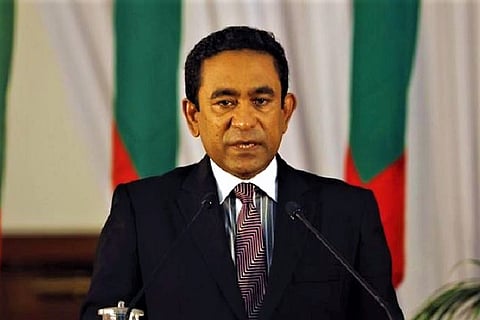

Maldivian President Abdulla Yameen called a state of emergency on Monday and ordered soldiers to arrest his 80-year-old predecessor, Maumoon Abdul Gayoom, his estranged half brother, who supported the main political opposition.
Yameen is in an escalating legal battle with the South Asian island nation's Supreme Court after judges ordered the release of all imprisoned opposition leaders in a surprise ruling last week. He ordered Chief Justice Abdulla Saeed and another of the Supreme Court's four judges arrested early Tuesday.
State of emergency
Yameen called a 15-day state of emergency, deepening a political crisis. The emergency decree grants wide powers for the security forces and police to make arrests, search and seize property and restricts freedom of assembly, officials said.
Soldiers forced their way into the Supreme Court building and arrested two of the tribunal's four justices. Police used pepper spray to disperse hundreds of protesters who had gathered outside the court.
Former President Gayoom was charged with bribery and attempting to overthrow the government, according to his lawyer.
'Unlawful order'
Mohamed Nasheed, Yameen's main rival and the country's first democratically elected president, urged people not to obey the "unconstitutional and illegal" declaration. Nasheed lives in exile in Britain and was one of the opposition leaders whom the court ordered released.
In a video message shortly before his arrest, Gayoom said: "I have not done anything to be arrested. ... I urge you to remain steadfast in your resolve, too. We will not give up on the reform work we are doing."
The opposition legislator Eva Abdulla said the state of emergency "only serves to show an isolated man who no longer has the confidence of the Maldivian people and independent institutions. He has no democratic mandate to govern and must resign immediately."
In a letter to the Supreme Court on Monday, Yameen wrote that judges had encroached on the powers of the state and called its recent ruling an "infringement of national security and public interest."
"The Supreme Court ruling stands in defiance of the highest authority in the country: the constitution," government spokesman Ibrahim Hussain Shihab said in a statement released on Monday.
The US State Department has criticized Yameen's actions. Spokeswoman Heather Nauert said the president had "systematically alienated his coalition, jailed or exiled every major opposition political figure" since his election in 2013. She called US officials "troubled and disappointed" by the developments in the Maldives.
How did it come to this? The Maldives has been mired in political unrest since Nasheed was ousted in 2012 and, in a controversial ruling, later sentenced to 13 years in prison on terrorism charges. Since then, Yameen's government has cracked down on dissent and jailed almost all the political opposition, reversing several years of democratic progress.
What was the Supreme Court ruling? Last week, judges ordered nine jailed opposition leaders freed, including Gayoom's son Farish, an opposition lawmaker. The ruling also ordered the government to reinstate 12 legislators who were sacked for defecting to the opposition, potentially paving the way to impeach the president. Yameen has defied the ruling.
How does Gayoom fit into this? He ruled the Maldives autocratically for 30 years, until the country's first democratic elections in 2008, in which Nasheed won power. He now supports the opposition and was campaigning for the toppling of his half brother and current President Yameen.
What happens next? Yameen is facing international pressure to follow the court order and reinstate the opposition. If that happens, he could face impeachment.
(This article was first published on DW. You can read the original article here.)